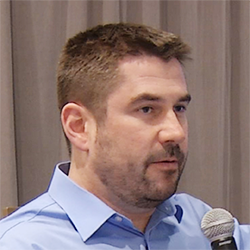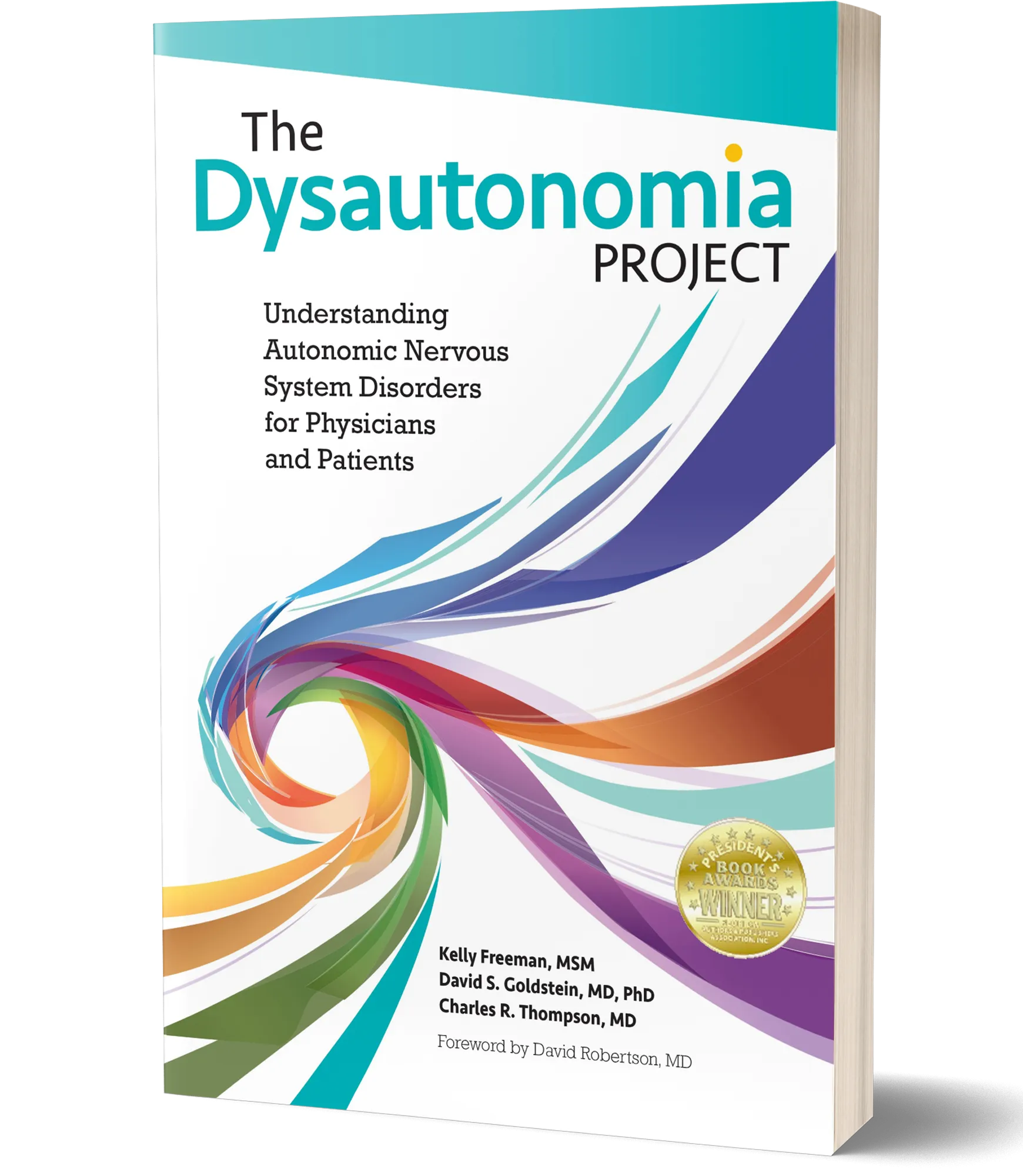Home » Dysautonomias » ANS Tests Part 1: The Most Important Autonomic Function Test
ANS Tests Part 1: The Most Important Autonomic Function Test
In this video Dr. Goldstein presents the most important autonomic function test, screening autonomic history.
There are numerous autonomic function tests. Nobody can undergo all of them. What is the most important autonomic function test? To me, the most important autonomic function test is the history. That’s the most important autonomic function test and we’re going to go into what that means because it doesn’t mean a checklist.
These are the elements of what I would call a screening autonomic history versus a chief complaint. In a few words, what’s the main problem that’s bothering you that’s bringing you here today? Just a phrase or sentence. It sounds kind of Mickey Mouse, but I can tell you that I had a case of a lady where the chief complaint eventually led to the discovery of a new syndrome. Chief complaint. This is a lady who is a grandmother in DC who came with a referral, referred for, orthostatic hypotension. And when I asked her what’s the main problem that’s bothering you, that’s bringing you here today, I was thinking she was going to say something like I faint a lot or I can’t tolerate standing up for a long time or something like that. But instead she said I can’t make spit. Well that’s weird, what happened to the orthostatic hypotension? Spit. Spit, that’s a parasympathetic cholinergic thing, the watery saliva. She said yeah, I can’t make spit and I am constipated and the combination of the two, I don’t eat. I can’t, everything tastes like cotton, it’s like cotton in my mouth and I am so constipated and so I’ve stopped eating. And she certainly looked like a concentration camp survivor or terminal cancer patient. Chief complaint, she can’t spit. Well you know now from the organization of the autonomic nervous system, that’s not sympathetic noradrenergic failure. Parasympathetic. Not sympathetic noradrenergic. But one thing led to another and it turned out that she had a pandysautonomia. Very rare situation where it is true that the entire autonomic nervous system is shot, failed, and this was because of a circulating antibody to the neuronal nicotinic receptor. Remember that’s the receptor for acetylcholine that mediates ganglionic transmission. And that was the first reported case of what came to be called autoimmune autonomic ganglionopathy, and it all came from the chief complaint. From the history.
The history of the present illness is the next section. The history of the present illness is the patient’s story. This is really key and it always starts the same way: when was the last time you felt completely healthy? And there are only a few possible answers that question. One is, I was healthy until… then whatever it was, the person can quote the day or what the situation was, and I’ve never been the same. Or the person can say, I’ve always been sick. I was sick as a kid, I was out of school, blah..blah..blah. Third possibility is – I don’t know, it has just been so gradual over the course of time. And that makes a huge difference in terms of your differential diagnosis. “I’ve always been sick” – well then you think about the developmental stuff, the genetic and so forth and so on. “I was healthy until…” – then you think about some acute event, maybe infectious disease and that kind of thing. “I don’t really know, it’s been so gradual” – well that points to more to kind of a degenerative process where there isn’t any overt event.
You always ask of course, have you noticed anything that makes things better or things worse – a really important clue. I had a patient who was referred, who came from Switzerland, who reported that he had painful sweating. That’s weird. Like he would drink orange juice let’s say, something that make a little bit of salivation, it would hurt, cause a headache. Really weird. He said that cocktail onions, you know the little onions that go in like a martini thing, was extremely potent in causing painful sweating. What am I supposed to say about that? Where does that come in in the autonomic… But then when I asked him, does anything make it better? He said yes. Oh really, what was that? He says, it’s a drug called Trospium, I was put on Trospium because I have a bladder problem like a cystitis kind of thing. Which is a little odd in a man, interstitial cystitis. And I was put on Trospium and it made my painful sweating go away. Well that’s cool! Now I have to…what the hell is Trospium? So while I’m on the phone with the guy from Switzerland, I’m getting on the pub med or whatever. It turns out that Trospium is a muscarinic cholinergic antagonist. He was taking it for his interstitial cystitis to kind of cool down his bladder. But drugs are stupid, they go everywhere, and it also inhibited muscarinic receptors in his forehead, and it eliminated his painful sweating. That was cool. So I brought him from Switzerland to the NIH and we did our autonomic workup. We figured out why he had painful sweating and how to treat it. And it wasn’t kind of a miracle. If Trospium a muscarinic antagonist worked, what about just a local cream that you could apply to where it hurts? And we had that cream compounded and it was like a miracle cure and he went home cured. Very rare. Anyway, that’s why you always ask if there’s anything make it worse or better, because you never know.
When it comes to a review of systems there are certain things you have to ask about. I’m kind of a chauvinist. If I’m dealing with a woman who’s let us say being referred for dysautonomia, whatever that is, I ask, who does your shopping? Because if the person answers, well I do, I love to shop. That’s the end. What I’m expecting is, well not me. Why is that? Because I can’t tolerate standing up, I feel like I’m going to die, I’m going to faint or something like, I have to curl my legs up like pretzels so I can’t shop. That’s my screening question for orthostatic intolerance. But more generally you can ask, do you have any problems if you’re standing up for long time still? Typically, in people who have orthostatic intolerance, they feel better when they’re exercising, whey they’re actually muscle pumping, than when they’re still after exercise. So, somebody complains of dizziness, I feel like I am going to faint during exercise. Very different thought process in the clinician’s head compared to, well I ‘m okay when I’m exercising but as soon as I stop that’s when I get into trouble. Do you sweat like other people? You don’t ask, how long have you not had any sweating, how long have you had dry skin? That’s leading the witness. Do you sweat like other people? That’s a pretty direct question for the sympathetic cholinergic system. If the person says, I never sweat, I used to sweat, until… and then I’ve never sweat ever since.
It’s also important to ask about heat intolerance and a large meal. With a large meal blood gets shunted towards the gut and digestion, and that can come at the expense of the blood pressure. So, a classic presentation of neurogenic orthostatic hypotension I call Miami-Chinese Restaurant Syndrome. You’ve this old person, a retiree of course in Florida, goes into a Chinese restaurant. The Chinese restaurant is super cold, air-conditioned. The person pigs out – after all the person’s a retiree, what are they supposed to do? So, they pig out in a Chinese restaurant. Then, after the meal, they go out into the heat, they get into their car, it’s blistering hot – they vasodilate. And that’s dangerous. They can lose consciousness and get into an auto accident and cause a lot of problems. What’s going on? Well, first of all, when the person pigs out, there’s a shunting of blood towards the gut, and the person is sitting. And when the person goes out into the heat, there’s vasodilation from the heat. The person gets into the car and the person is forced to be sitting in a sitting position. This combination of the postprandial situation, and the heat and the immobilities of sitting up, is asking for orthostatic hypotension. That’s why I call it Miami-Chinese Restaurant Syndrome.
Do you make spit like other people? This is a parasympathetic cholinergic phenomenon. Although the proteinaceous kind of thick saliva, that’s more sympathetic noradrenergic. Any problems with urination? A really important question to ask in somebody with Parkinsonism for instance. People with Parkinson’s disease often have urinary frequency and urgency. People with the Parkinsonian form of Multiple System Atrophy, they have or they can have, urinary retention, they have to self- catheterize and so forth. You don’t ask, do you have urinary retention? Just ask, do you have any problems with urination? Any problem with bowel movements? We already talked about the lady who had the constipation and dry mouth. Any problems with sexual function?
Those are the screening questions. This is the most important autonomic function test.

Wolfgang Singer, MD
Associate Professor of Neurology
Mayo Clinic Rochester, MN































